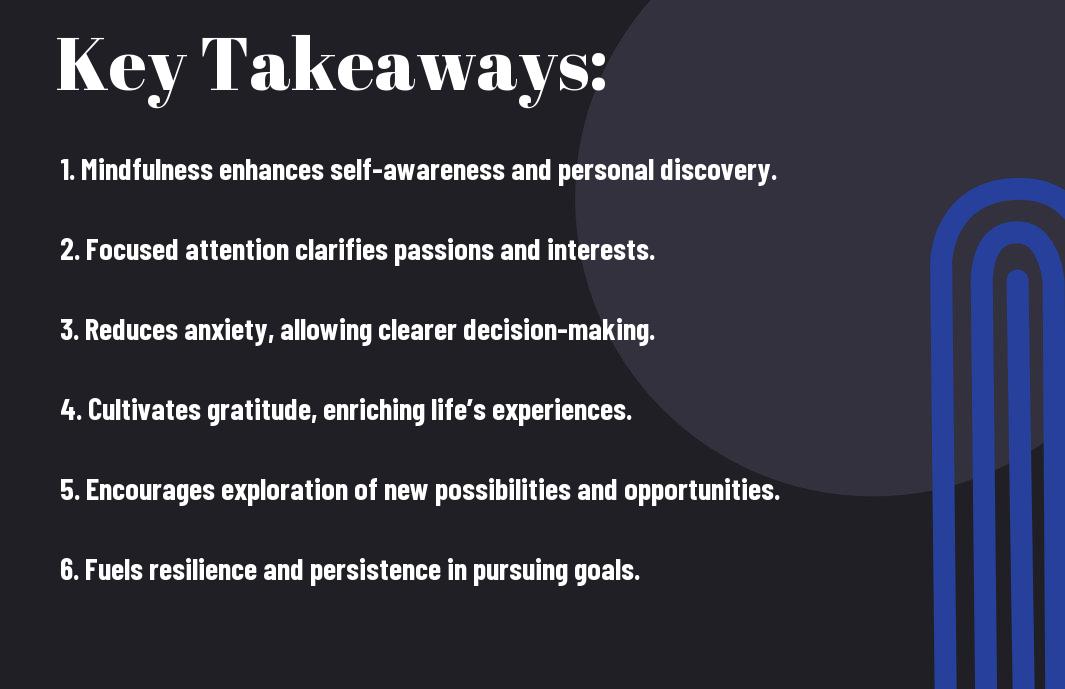Purpose-driven living begins with a deep understanding of yourself, and mindfulness can be a transformative tool in this journey. By cultivating present-moment awareness, you create space to explore your thoughts, feelings, and desires, ultimately leading you to uncover your true passions and purpose. As you practice mindfulness, you learn to tune into your inner voice, allowing clarity and insight to guide your decisions. This blog post will explore how embracing mindfulness can empower you to navigate the path toward a more fulfilling and meaningful life.
Understanding Mindfulness
The journey of finding your passion and purpose often begins with understanding mindfulness. This practice allows you to cultivate a deeper awareness of the present moment, enabling you to engage with your thoughts and feelings without judgment.
Definition and Principles
One of the core definitions of mindfulness is the practice of maintaining a moment-by-moment awareness of your thoughts, feelings, bodily sensations, and surrounding environment. Its principles emphasize being non-judgmental, open, and accepting of your experiences as they arise.
Historical Context
Mindfulness has roots in ancient contemplative practices, particularly within Buddhism. It has evolved over centuries, bridging traditional spiritual practices with modern psychological understandings, reaching a wide audience seeking mental well-being.
It is crucial to recognize that mindfulness as a concept has been utilized for millennia, particularly in Eastern philosophies. The ancient teachings of Buddhism laid the groundwork for mindfulness practices, highlighting meditation as a way to cultivate awareness and acceptance. In contemporary settings, mindfulness has gained recognition in the West, especially in the fields of psychology and health, where it is seen as a tool for stress management and emotional regulation.
Types of Mindfulness Practices
An array of mindfulness practices are available, each catering to different needs and lifestyles. Common types include:
- Meditation
- Body scan
- Mindful breathing
- Walking meditation
- Mindful eating
After exploring these types, you can select those that resonate most with you to incorporate into your daily life.
| Mindfulness Practice | Description |
|---|---|
| Meditation | A focused practice aimed at calming the mind. |
| Body Scan | Awareness exercise focusing on body sensations. |
| Mindful Breathing | Attention to the breath as a centering practice. |
| Walking Meditation | Combines mindful awareness with movement. |
| Mindful Eating | Enhances the experience of meals through awareness. |
Principles of mindfulness emphasize the importance of cultivating an open and non-judgmental attitude towards your thoughts and experiences. Some pivotal principles include:
- Non-judgment
- Acceptance
- Present-moment focus
- Curiosity
- Self-compassion
After integrating these principles, you may find it easier to foster a mindful lifestyle, enriching your journey in discovering your passion and purpose.
| Mindfulness Principle | Description |
|---|---|
| Non-judgment | Observing thoughts without labeling them as good or bad. |
| Acceptance | Allowing your experiences to unfold without resistance. |
| Present-moment focus | Engaging fully with the now, rather than dwelling on the past or future. |
| Curiosity | Approaching experiences with an open mind and inquisitive spirit. |
| Self-compassion | Being kind and understanding towards yourself in times of struggle. |


The Importance of Passion
Any exploration of your life purpose inevitably leads to the discussion of passion. Passion fuels your motivation, invigorates your daily activities, and brings joy to your life. Recognizing the importance of passion is the first step toward creating a fulfilling existence, as it serves as a compass guiding you toward authentic experiences and choices aligned with your true self.
Identifying Your Interests
On your journey to uncover your passion, it’s vital to identify your interests. Take the time to reflect on what captivates your attention, ignites your curiosity, and brings you a sense of enthusiasm. By actively engaging with your interests, you can begin to pinpoint the activities and topics that resonate with your inner self. Using mindfulness techniques can enhance this exploration, as it allows you to observe your thoughts and feelings without judgment.
The Connection Between Passion and Well-being
On a profound level, your passion has a significant impact on your overall well-being. When you engage in activities that genuinely excite you, you experience heightened levels of joy, fulfillment, and satisfaction. This sense of purpose fuels not only your creativity but also your resilience in the face of challenges. Passion acts as a cornerstone for mental well-being, as it nourishes your spirit and provides a protective layer against stress, anxiety, and feelings of emptiness.
It is vital to understand that passion and well-being are intrinsically linked. When you pursue what you love, your sense of happiness and motivation increases, creating a positive feedback loop. This alignment between your passions and well-being fosters a balanced, fulfilling life where you can thrive. Discovering and nurturing your passions will not only lead you closer to your purpose but also contribute significantly to your mental and emotional health, making your journey through life much more enriching.
Discovering Purpose Through Mindfulness
Not only does mindfulness help you calm your mind, but it also plays a crucial role in discovering your purpose in life. By tuning into the present moment and reflecting on your values, you can align your daily actions with what truly matters to you, guiding you toward a more meaningful existence.
Aligning Values and Actions
The alignment of your values and actions is vital for a fulfilling life. When your daily activities reflect your core beliefs, you create a sense of authenticity and purpose. Mindfulness practices enable you to assess your values and recognize areas where you may be acting out of alignment, fostering a clearer sense of direction.
The Role of Self-Reflection
To uncover your purpose, self-reflection is an crucial step. Taking time to contemplate your experiences, decisions, and feelings allows you to gain insight into what truly drives you and what you want out of life.
Mindfulness encourages a deeper level of self-reflection by promoting an awareness of your thoughts and emotions. Through regular practice, you can cultivate a mindset that embraces honesty about your desires and motivations, which is instrumental in recognizing your passions and purpose. By becoming more attuned to yourself, you will unlock the potential to pursue what genuinely fulfills you.
Mindfulness Techniques for Purpose Discovery
Actions such as meditation, journaling, and breathwork can aid in uncovering your purpose. These mindfulness techniques help you tune into your inner voice and intentions, making it easier to discern what you are truly passionate about.
Purpose emerges when you actively engage in mindfulness techniques that promote self-awareness and understanding. Incorporating practices like guided meditations focused on your life’s direction, or journaling your thoughts and feelings, creates space for clarity. By regularly dedicating time to these activities, you can better navigate the path toward discovering what truly ignites your passion and provides a sense of fulfillment.
Integrating Mindfulness in Daily Life
Many individuals struggle to incorporate mindfulness into their daily routines. However, integrating mindfulness into your life doesn’t have to be overwhelming. By making small adjustments and committing to a regular practice, you can cultivate greater self-awareness and find clarity in your pursuit of passion and purpose.
Creating a Mindfulness Routine
Mindfulness can flourish when you establish a consistent routine. Designate specific times during your day for mindfulness practices, such as meditation, deep breathing, or mindful walking. Consider starting your mornings with just a few minutes of focused awareness or dedicating time during lunch breaks for a brief mindfulness exercise. By making it a regular part of your day, you’ll train your mind to find calm amidst the chaos.
Overcoming Obstacles to Mindfulness
Obstacles to mindfulness can often emerge in your daily life, making it challenging to maintain consistency and focus. Busy schedules, distractions, and preconceived notions about what mindfulness should be can hinder your progress. Recognizing these obstacles is the first step toward overcoming them.
Another significant barrier you may face is self-doubt, which can lead to frustration when you feel you aren’t ‘doing it right.’ Recall, mindfulness is not about perfection; it’s about presence. Acknowledging that every effort you make counts can help mitigate these feelings. Additionally, practicing mindfulness in short bursts throughout the day can keep you grounded, enabling you to gradually strengthen your practice and integrate it into your lifestyle more effectively.
Conclusion
On the whole, embracing mindfulness can significantly enhance your journey toward discovering your passion and purpose. By cultivating present-moment awareness, you empower yourself to reflect on your true interests and values, enabling clearer insights into what you genuinely desire. This process not only fosters a deeper connection with yourself but also helps you navigate obstacles with resilience and clarity. As you integrate mindfulness into your daily life, you’ll find that it guides you toward a more fulfilling and purpose-driven existence.
- Unlocking the Secrets to Wealth – A Guide on How to Harness the Power of Money and Success in Your Life - January 6, 2025
- Love Languages Decoded – Understanding How to Communicate Affection - September 23, 2024
- Unlocking the Secrets to Wealth – A Guide on How to Harness the Power of Money and Success in Your Life - September 23, 2024
Views: 1

